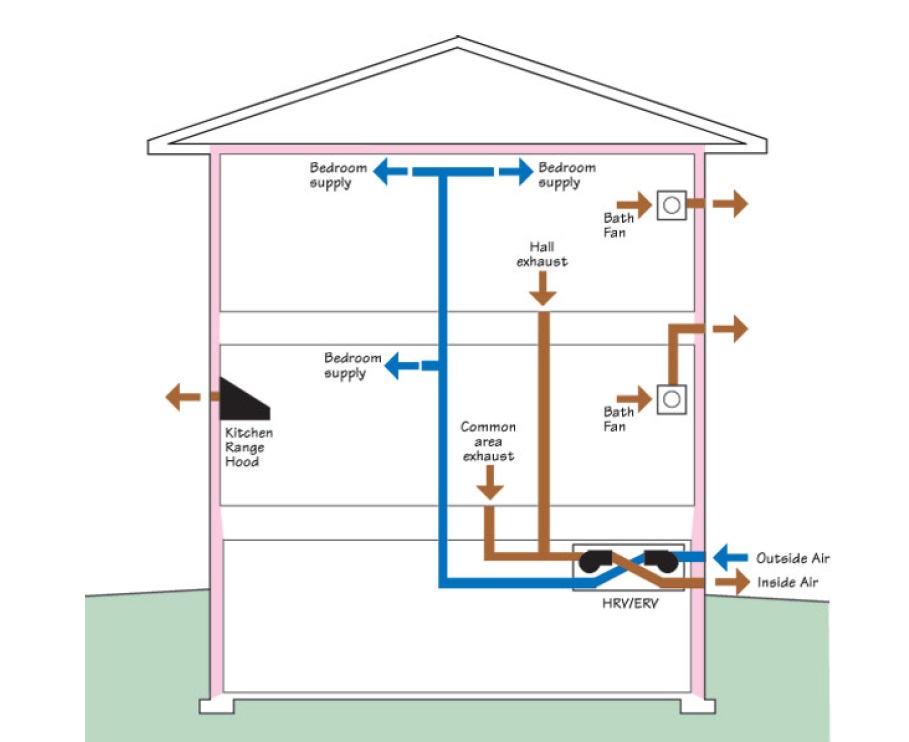How Effective Home Ventilation Can Boost Convenience and Energy Performance
Reliable home air flow plays an essential function in improving both convenience and energy efficiency. It assures a regular circulation of fresh air while removing stagnant, damp air. This procedure can lead to a much healthier living setting and lower energy consumption. However, many house owners forget the importance of appropriate air flow. Recognizing the various ventilation systems and their advantages can reveal substantial understandings right into boosting indoor problems. What might be the very best approach for maximizing these systems?
Recognizing the Importance of Home Ventilation
Home ventilation plays a necessary duty in maintaining indoor air high quality and convenience. It entails the process of removing and providing air from a room to assure that fresh air circulates while stagnant air is removed. Appropriate ventilation aids to minimize interior contaminants, such as irritants, dirt, and volatile organic compounds, which can accumulate with time. Additionally, it controls humidity levels, stopping the development of mold and mildew and mold, which can adversely influence wellness and architectural integrity. Comprehending the importance of home ventilation additionally consists of acknowledging various systems, such as natural, mechanical, and hybrid methods, which can be used to boost air exchange - Home Ventilation Melbourne. Ultimately, reliable air flow is essential for developing a healthy living setting and securing total health within the home

Advantages of Proper Air Movement in Your Home
Correct airflow within a residence considerably enhances the overall living experience. Boosted air blood circulation assists control interior temperatures, making rooms much more comfy throughout the year. In addition, proper air flow decreases humidity levels, which can stop mold development and safeguard the structural honesty of the home. Enhanced air flow additionally adds to much better interior air top quality by watering down and removing pollutants, allergens, and odors, advertising a healthier living environment. Efficient air movement can lead to reduced power intake, as well-ventilated homes require less heating and cooling, ultimately reducing energy bills. Ultimately, a well-ventilated home can increase residential property worth, as potential purchasers value the benefits of a comfortable, energy-efficient area. For that reason, making sure correct air flow is important for both convenience and long-lasting sustainability.
Common Air Flow Systems and Their Features

Tips for Optimizing Your Home Ventilation
Many homeowners might forget the relevance of effective air exchange, optimizing ventilation can considerably enhance interior air top quality and convenience. Routine maintenance of air flow systems is crucial; cleansing filters and ducts protects against contaminants from distributing. Homeowners need to also think about using exhaust followers in restrooms and cooking areas to get rid of excess dampness and smells. Additionally, strategically check my reference putting vents can enhance airflow throughout the home. Using natural ventilation, such as opening up home windows throughout favorable weather, can even more enhance air exchange. It is also helpful to keep track of indoor moisture levels, aiming for an equilibrium between 30-50%. Incorporating houseplants can naturally filter air, adding to a healthier living atmosphere. These practical tips can cause a much more comfy and inviting home.
How Efficient Ventilation Can Lower Energy Expenses
Optimizing power efficiency in a home often depends upon efficient air flow techniques. Proper ventilation systems assist manage indoor temperature levels, decreasing the need for excessive heating or air conditioning. By promoting the exchange of stale indoor air with fresh outside air, these systems can maintain a comfortable atmosphere, reducing dependence on heating and cooling systems. This brings about lower power intake and, as a result, minimized energy costs. Additionally, efficient air flow helps to remove moisture and toxins that can endanger air top quality, further improving total energy efficiency. Home owners that purchase top notch ventilation solutions typically find that the lasting cost savings in power prices considerably surpass the first investment, adding to both ecological and monetary benefits. Ultimately, efficient air flow is a vital component in accomplishing lasting energy use in property setups.
Regularly Asked Concerns
Exactly how Usually Should I Examine My Ventilation System?

The regularity of inspecting a ventilation system need to usually be every 3 to six months. Routine inspections assist identify issues early, making sure excellent performance and keeping air quality within the home for owners' wellness and comfort.
Can I Set Up Air Flow Equipments Without Expert Help?
The question of mounting air flow systems without specialist aid emerges often. While some people have the abilities to embark on such jobs, most professionals suggest seeking advice from professionals to guarantee safety, great post to read efficiency, and compliance with building codes.

What Indicators Indicate Poor Home Ventilation?
Indicators of poor home air flow include too much moisture, condensation on windows, stuffy smells, persistent dust build-up, and temperature variations. These signs suggest inadequate air flow, possibly leading to pain and minimized indoor air top quality.
Exist Eco-Friendly Ventilation Options Available?
Environment-friendly air flow choices exist, consisting of energy recuperation ventilators, all-natural ventilation systems, and easy layout methods. These services highlight sustainability by lowering energy consumption while enhancing indoor air high quality and maintaining comfortable living settings for residents.
How Does Weather Condition Affect Home Air Flow Efficiency?
Climate significantly influences home ventilation effectiveness - Home Ventilation Melbourne. High moisture can hinder air flow, while extreme temperatures might require more energy for heating or cooling, influencing total system efficiency and interior convenience degrees throughout various periods
Comprehending the value of home air flow also consists of identifying numerous systems, such as natural, mechanical, and crossbreed approaches, which can be used to improve air exchange. Natural ventilation counts on vents, doors, and home windows to permit fresh air to move in and stale air to departure, advertising passive air circulation. Supply air these details flow systems present fresh exterior air right into the building, boosting air quality. Many home owners may forget the importance of reliable air exchange, maximizing air flow can substantially enhance interior air high quality and convenience. Environmentally friendly air flow alternatives exist, including energy recovery ventilators, all-natural air flow systems, and passive design strategies.